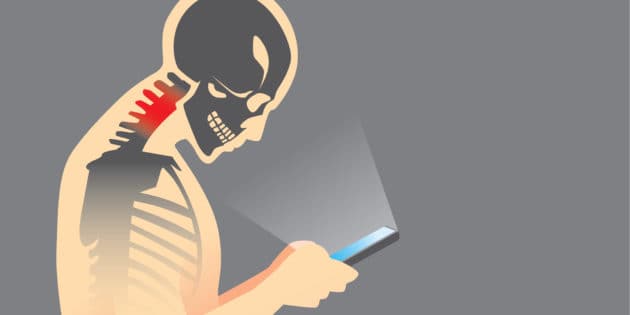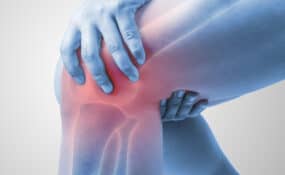We know what it’s like. When your neck feels out of alignment, or strained or stiff, all you want is one thing – relief. Sweet, pain-free, silky, tangible relief. To find this neck-based paradise, it’s common to follow an urge to ‘crack your neck’.
But what exactly does that do?
And is it safe for you?
Well, contrary to what Hollywood may tell us, ‘cracking your neck’ doesn’t refer to ‘breaking your neck’. Unless you are incredibly hamfisted, or there is a terrible accident, you are unlikely to be able to break your own neck.
But – is cracking your own neck dangerous?
Let me explain the answer.
What Is Neck Stiffness?
First things first, it’s incredibly common to suffer from neck stiffness. Far from unusual and usually a consequence of lifestyle and posture issues, stiffness of the neck can occur from too much time sitting down (such as working from a desk or from behind the wheel), sleeping awkwardly, or incorrectly lifting heavy objects.
A stiff neck can be characterized by soreness and considerable difficulty in moving the neck, especially when turning your head to look side to side. Accompanying symptoms include simmering headaches, neck pain (obviously), a sensation of discomfort in the shoulder area, and arm pain.
Require a quick-fire diagnosis on the spot? Try looking sideways over your shoulder. If the pain makes such a movement too difficult (or impossible) and you therefore need to move your entire body to look each way, then – congratulations! – you have a stiff neck.
Most people will encounter neck stiffness at some point in their life. Sometimes, it appears after a night’s sleep or will develop over a day where strenuous activity has taken place. It’s so common to find that moving house, lifting furniture, playing sports, and outdoor activities can cause neck stiffness.
Most cases heal up after a week, however, each individual is different and pain levels will differ from person to person, depending on their overall muscle strength and level of health.
By resting for a couple of days, you allow the neck’s soft tissues to heal. To help make yourself more comfortable, you can purchase pain medication or apply heat therapy.
To aid recovery, keep normal activity levels where possible, especially after the first 24 hours of feeling stiffness in your neck. Wearing any form of cervical collar to restrain your neck movement is not advised. All you are doing is prolonging your discomfort!
If the neck pain/stiffness has not shifted after seven days, we’d advise a visit to the doctor – especially if you develop any feverish symptoms, nausea, unexplained fatigue, or vomiting.
When suffering from neck stiffness, it’s hard to resist the craving for instant relief from a quick crack of the neck. By cracking your neck, you can set yourself free from the discomfort and get back into the swing of life; even if some researchers claim that ‘neck cracking’ is a psychological placebo effect. Everyone to their own!
So….Cracking Your Neck…
Let’s get one thing straight – cracking your joints remains a common habit for many of us. Cracking our fingers, knuckles, backs, and toes is hardly a new trend. So why is cracking our neck considered dangerous?
Not everyone cracks their joints for the same reason. Some of us feel ‘thuggish’ when undertaking such activity, some develop a habit, and others release the pressure that we are feeling in a certain area. Yet, if done violently or too often, you can cause damage.
And that’s where there is danger for your neck. If you crack your neck joints by simply turning your head then chances are there is no hazard for injury, especially if it happens only occasionally. However, if you force your neck to crack suddenly, you won’t be doing yourself much good!
If you feel building pressure in your neck, then a quick neck crack isn’t your safest option towards recovery. If you have been feeling stiffness in your neck over a prolonged period, or cracking makes no difference, then we’d recommend contacting a physical therapist or a chiropractor.
What Makes That Cracking Noise?
That ‘popping’ or ‘cracking’ noise isn’t because the joint is moving. It’s not even because the joints are developing friction. When you crack your neck, there are capsules around your joints that become stretched. And this is where squeamish folk should now look away.
These capsules contain fluid, and stretching them decreases the pressure on the joint. As this pressure decreases, the capsule fluid around the joint turns from liquid to a gas (comprised of nitrogen, carbon dioxide, and oxygen).
When the fluid becomes gas, it makes that ‘cracking’ noise that we feel radiate through our joints. To those with knowledge of healthcare lingo, this process is known as ‘boiling’ or ‘cavitation’, and is usually not harmful or injurious.
Your neck has several joints; known as facet joints. These joints sit on either side of your neck, and when you crack your neck, the facet joints stretch and facilitate the spreading of fluid in the capsule. As this then becomes a gas, there is a sense of releasing pressure from around your neck area.
Some have proclaimed that the ‘cracking’ noise is actually the bursting of a bubble that is created in the joint.
Leave Neck Cracking To The Professionals
Armed with this knowledge, people believe themselves to be proficient with the administration of cracking joints. Yet, you can easily end up applying too much pressure and doing more harm than good.
While a friend or family member may offer to help ‘crack your neck’ for you, we would not recommend it! When it comes to your back and neck, only seek assistance from a licensed physical therapist or chiropractor.
Why? Again, if you are squeamish, best to skip this bit.
A further reason for that ‘cracking’ noise is the result of tendons and ligaments moving over one another, or enveloping the joints. Ligaments connect our bones, and tendons connect the muscles to our bones.
Oftentimes, these ligaments and tendons in your neck are too tight or too loose, and they ‘crack’ when you force the muscles to rub against your bones.
If this is occurring, you need to utilize knowledge of the neck area and tread with caution as not to cause further injury. Popping joints releases endorphins that temporarily relieve pain. This can actually become addictive and must be managed accordingly to aid recovery – rather than being stuck in a painful situation.
Then there is the monitoring of the recovery process. Cracking your joints does not indicate that there has been any positive readjustment. To recover successfully, you need to perform certain stretches and exercises. That’s where a physical therapist comes in. You can speak with someone from Intecore through our contact page.
While we are talking about seeking the help of a physical therapist, let’s debunk a common urban myth. It’s commonplace to hear people talking about how ‘cracking your joints can lead to arthritis.
There is no solid research that demonstrates any form of a direct link between arthritis and cracking your joints. However, if you have arthritis, then cracking your joints can have unpleasant consequences. As a physical therapy clinic, we can help you manage your arthritis. Speak with us, we can help you.
Neck Cracking: Is It Bad For You?
Cracking your neck should never hurt, and you should not have to force it. If cracking your neck hurts, or you have to really force your neck to crack, then you are likely doing yourself some harm.
Constantly forcing your neck to crack causes damage to the abundance of blood vessels in that area of your body. You really don’t want to be doing that, as these vessels transport blood to and from the brain. Damaging these vessels can increase your risk of stroke.
You can cause long term damage other than the risk of strokes, too. By forcefully cracking your neck and overextending those muscles, tendons, and ligaments, you will weaken their ability to hold your head up properly. This can lead to a domino effect later in life. And you don’t want that, either!
Otherwise, occasionally cracking your neck should not pose any real form of immediate danger – unless there is another underlying condition or injury present in your neck muscles/joints.
For instance, we would ask you to refrain from cracking your neck if you have a full-on neck strain, whiplash, or if your neck/shoulder areas are swollen. Recently had an accident or surgery? Again – try to avoid cracking your neck.
Get In Touch With Us
We can help you!
Suffering from stiffness in your neck, or any of the painful conditions mentioned here does not make you a freak of nature. These conditions are incredibly common, and we have a formulated package of care that will help you get back to the life you deserve.
Get in touch with us through our contact page, and check out our free guides on our back pain and shoulder pain pages.
Don’t forget that you can request a free 20-minute Discovery Session.
It’s time to get you back in shape. Reach out. We are always here to assist you.
- Why Regular Body Maintenance is Crucial for Long-Term Health - April 21, 2024
- 3 Things Aggravate Knee Pain After Biking and How to Ease It - April 14, 2024
- Runners Knee Stretches: Top 5 Stretches Every Runner Needs to Know - April 7, 2024





















